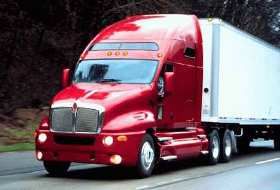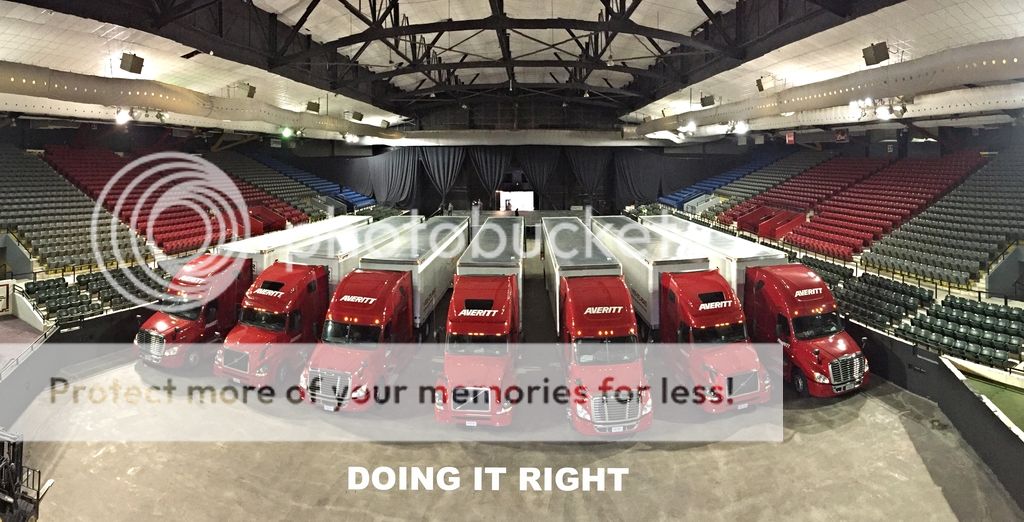The Highs Are Really High And The Lows Are Really Low
Topic 8400 | Page 1

All i can i say is wow! Well thanks for insight ill keep that in mind when i start next week. Hope tommorrow is better than today good luck out there and be safe.

Yep that happens. Want to really tick off those morons? Smile and wave at them (with all your fingers).
HOS:
Hours Of Service
HOS refers to the logbook hours of service regulations.Dude, that sounds awful! Walk away from this experience with lessons learned. We as drivers need to analyze everything we do. When you backup, ask yourself what you could have done better. When you get to a customer, how accurate was your local directions planning? If you didn't do any and you're completely relying on the GPS then rest assure that an accident is waiting to happen. When you get into a bad situation driving, when you get out of it ask yourself what you did wrong, what you could have done to avoid the problem, and what establish things that you need to work on.
You're constantly a work in progress. There is no driver who knows it all. We all get better and better with more experiences, and with each bad experience there's always many lessons learned.
First, never listen to the GPS. It doesn't matter if it's a Rand McNally or the GPS on your QC. Always plan out your route and establish backup plans. Use Google Earth to get a birds eye view of the area before driving. A GPS will lead you down the wrong road many times. Be especially careful in large, crowded cities.
Also, your company might tell you to turn here or there but if anything happens you were still the captain of your ship and if anything happens you will be blamed, not the company or their routing. In Dude's case, his company routing sent him on a street that he knew he had no business turning on. In this situation you want to stop and assess what's going on. If you don't think you can make it then do not even attempt the turn. Stop and pause yourself for a moment, if that means stopping traffic then that's fine. It's better to stop traffic for 30 seconds, analyze the situation and make the right call than to take the turn and damage the property or equipment.
Always plan everything out completely and never rush. You should know the area so well before even driving in it that you could point out landmarks that you saw on Google Earth. That's just how thorough you need to be to stay accident free.
Dude, thank you for posting this to give everyone a learning opportunity. This kind of stuff happens to everyone on their first few months. My first months weren't pretty at all.
Come back with your head held high and learn from the experience. Be extra vigilant in everything you do out here from now on.
PS: I've also pondered becoming a Sasquatch and settling in the Snoqualmie Mtns.
Dm:
Dispatcher, Fleet Manager, Driver Manager
The primary person a driver communicates with at his/her company. A dispatcher can play many roles, depending on the company's structure. Dispatchers may assign freight, file requests for home time, relay messages between the driver and management, inform customer service of any delays, change appointment times, and report information to the load planners.
Dude, that sounds awful! Walk away from this experience with lessons learned. We as drivers need to analyze everything we do. When you backup, ask yourself what you could have done better. When you get to a customer, how accurate was your local directions planning? If you didn't do any and you're completely relying on the GPS then rest assure that an accident is waiting to happen. When you get into a bad situation driving, when you get out of it ask yourself what you did wrong, what you could have done to avoid the problem, and what establish things that you need to work on.
You're constantly a work in progress. There is no driver who knows it all. We all get better and better with more experiences, and with each bad experience there's always many lessons learned.
First, never listen to the GPS. It doesn't matter if it's a Rand McNally or the GPS on your QC. Always plan out your route and establish backup plans. Use Google Earth to get a birds eye view of the area before driving. A GPS will lead you down the wrong road many times. Be especially careful in large, crowded cities.
Also, your company might tell you to turn here or there but if anything happens you were still the captain of your ship and if anything happens you will be blamed, not the company or their routing. In Dude's case, his company routing sent him on a street that he knew he had no business turning on. In this situation you want to stop and assess what's going on. If you don't think you can make it then do not even attempt the turn. Stop and pause yourself for a moment, if that means stopping traffic then that's fine. It's better to stop traffic for 30 seconds, analyze the situation and make the right call than to take the turn and damage the property or equipment.
Always plan everything out completely and never rush. You should know the area so well before even driving in it that you could point out landmarks that you saw on Google Earth. That's just how thorough you need to be to stay accident free.
Dude, thank you for posting this to give everyone a learning opportunity. This kind of stuff happens to everyone on their first few months. My first months weren't pretty at all.
Come back with your head held high and learn from the experience. Be extra vigilant in everything you do out here from now on.
PS: I've also pondered becoming a Sasquatch and settling in the Snoqualmie Mtns.
This is Prime QC routing I'm following which is funny because I almost never follow it on the long haul. I route myself using my atlas and find myself on state highways shaving many miles off. When I come into the 90 and the QC gives me 15 steps from the x-way through a metropolis to the 90, I feel like it should be trustworthy. The truth is this is the point when your own routing is the most important.
I once told my TNT trainer that TNT seems like a sequence of making mistakes that you will learn lessons from and never make again.
Learning these lessons also carries well into starting your solo career.
Dm:
Dispatcher, Fleet Manager, Driver Manager
The primary person a driver communicates with at his/her company. A dispatcher can play many roles, depending on the company's structure. Dispatchers may assign freight, file requests for home time, relay messages between the driver and management, inform customer service of any delays, change appointment times, and report information to the load planners.OWI:
Operating While Intoxicated
TNT:
Trainer-N-Trainee
Prime Inc has their own CDL training program and it's divided into two phases - PSD and TNT.
The PSD (Prime Student Driver) phase is where you'll get your permit and then go on the road for 10,000 miles with a trainer. When you come back you'll get your CDL license and enter the TNT phase.
The TNT phase is the second phase of training where you'll go on the road with an experienced driver for 30,000 miles of team driving. You'll receive 14¢ per mile ($700 per week guaranteed) during this phase. Once you're finished with TNT training you will be assigned a truck to run solo.
Dude, totally understand and sorry to hear that cagers were so helpful with the single finger directions. It's one bad morning among the many amazing days you've had this far. Be like a duck and let it slide off your back and keep Rollin, you'll forget about it faster than the good memories you've packed away so far. I think everyone gets overwhelmed but what makes any of us successful is being able to overcome, say screw it, you won't get the best of me.
Managing your emotions is critical in any situation, but even more so in complex and dangerous situations like you're in all the time driving a rig. Not only will getting emotional keep you from making clear-minded decisions, but it wears you out, further preventing you from being alert and thinking clearly.
I always had a policy to never make important life decisions unless I'm having an awesome day. If it's 38 degrees outside, rain is pouring down, I'm running on three hours of sleep, and nothing has gone my way I'm not about to make any important decisions like changing jobs or moving to a commune in the woods. I wait until it's 75 degrees out, the sun is shining, and I'm having a wonderful time of it. If I want to do something under the best of conditions then it's probably something I really want to pursue. It's not just an emotional reaction to a bad day.

PS: I've also pondered becoming a Sasquatch and settling in the Snoqualmie Mtns
Not quite tall enough! Oh and those are the Cascades... LOL Snoqualmie happens to be an indian tribe they named the pass after.
If it's 38 degrees outside, rain is pouring down, I'm running on three hours of sleep, and nothing has gone my way I'm not about to make any important decisions like changing jobs or moving to a commune in the woods.
Do you thing Sasquatch lives in a commune? Maybe that's why you never see them, the leader keeps them all locked up.
HOS:
Hours Of Service
HOS refers to the logbook hours of service regulations.
Although I'm not a truck driver yet, (I'm getting my CDL and getting ready for classes), I understand what your going through. I'm a retired professional fire fighter and I drove fire trucks and ladder trucks for over 20 years. Just like GPS, I couldn't rely on the city keeping us up to date on what streets are closed for repairs or which hydrants were out of service. I always had a back up plan in my mind when the alarm went off. Even going into a burning building we always had one to two back up plans. The best thinking I found was to "take a step back and take a deep breath" and look at the whole picture. I'm not being critical of your situation. I had people in cars that wouldn't pull over for an emergency vehicle and would flip me off. I just smiled and waved.
As the saying goes "Don't Sweat The Small Stuff. It's All Small Stuff"
CDL:
Commercial Driver's License (CDL)
A CDL is required to drive any of the following vehicles:
- Any combination of vehicles with a gross combined weight rating (GCWR) of 26,001 or more pounds, providing the gross vehicle weight rating (GVWR) of the vehicle being towed is in excess of 10,000 pounds.
- Any single vehicle with a GVWR of 26,001 or more pounds, or any such vehicle towing another not in excess of 10,000 pounds.
- Any vehicle, regardless of size, designed to transport 16 or more persons, including the driver.
- Any vehicle required by federal regulations to be placarded while transporting hazardous materials.

Managing your emotions is critical in any situation, but even more so in complex and dangerous situations like you're in all the time driving a rig. Not only will getting emotional keep you from making clear-minded decisions, but it wears you out, further preventing you from being alert and thinking clearly.
I always had a policy to never make important life decisions unless I'm having an awesome day. If it's 38 degrees outside, rain is pouring down, I'm running on three hours of sleep, and nothing has gone my way I'm not about to make any important decisions like changing jobs or moving to a commune in the woods. I wait until it's 75 degrees out, the sun is shining, and I'm having a wonderful time of it. If I want to do something under the best of conditions then it's probably something I really want to pursue. It's not just an emotional reaction to a bad day.
Amen to that!
New Reply:
New! Check out our help videos for a better understanding of our forum features

















Preview:
This topic has the following tags:
Advice For New Truck Drivers GPS Systems Hard Lessons Learned Truck Driving Stories







 TT On Facebook
TT On Facebook
One thing I've learned in the past few months of being solo is that this job running OTR will give you such a great high one day and completely tear you down the next. This is especially true in the flatbed sector where the nature of your shippers/receivers can differentiate so much.
Yesterday, I had the most fun I've ever had driving. I woke up somewhere in Montana and shut down somewhere just outside of Seattle, which means I got to do Lookout, Fourth Of July and Snoqualmie. I did Snoqualmie when the sun was setting and it was amazing. I shut down with 00:02 left on my 11. Pumping out almost 670 miles earned me about $300 for the day while having a blast. It was just a day full to the brim of breathtaking scenery, driving fun mountain passes and making good money.
Unfortunately, I then had to wake up today. The place I had shut down at right outside of Seattle was right on the property of my first of two deliveries that this load had. I woke up three hours after I went to sleep and five hours before my unloading appointment to a guy banging on my door. He wanted my tarps off so he could take his pallets. I guess they like coming in at 3 a.m. PST to unload trucks here. So I obliged, like a zombie in the cloak of night, pulling tarps, straps and bungees off.
Then I sat there for a really long time waiting for my 10 hour break to finish so I could drive up into downtown Seattle to get the rest of the load off.
About a mile from my last delivery, my e-log routing sent me around a downtown turn that I had no business turning on. I took it, the best I could, but I couldn't have ever made it. What ended up happening is I got around it, but I popped a trailer tire and bent a rim on a fire hydrant or pole or whatever that yellow thing was. I had to have road assist come fix it and cost my company money and had to have a conversation with safety.
Two things I did that you should never do: I trusted my QC navigation wholeheartedly and I didn't GOAL.
Making my way back out of Seattle I got multiple fingers for driving too slow while trying to navigate myself out. I rolled my window down at a red light and allowed myself to get into an eff you party with a guy in a van who's day I had apparently ruined. Just a really crappy experience in a metropolis.
So I spent most of the day totally bummed out. I almost decided that I was ready to quit and just go back home to take my Fedex box truck route back to make 30k less per yer. I thought about going off the grid and joining a commune. I wondered if I could just abandon my truck and go live off of the land in the mountains of Washington like a sasquatch.
What happens out here is you might have one of the best days of your life directly followed by one of the worst days of your life. This can be a very emotionally driven job.
I think it's important for new drivers to understand that your experience doing this will be extremely volatile. You will have so much fun one day and mess up so bad the next. To survive out here you need to keep your emotions at bay and judge how much you like doing this on a wider body of work than a day by day basis.
This is a lesson I'm trying to learn early into my solo career.
Shipper:
The customer who is shipping the freight. This is where the driver will pick up a load and then deliver it to the receiver or consignee.
OTR:
Over The Road
OTR driving normally means you'll be hauling freight to various customers throughout your company's hauling region. It often entails being gone from home for two to three weeks at a time.